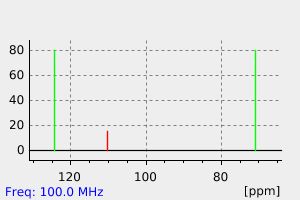2-iodoprop-2-en-1-ol | 84201-43-4
中文名称
——
中文别名
——
英文名称
2-iodoprop-2-en-1-ol
英文别名
2-iodoallyl alcohol;2-iodo-2-propen-1-ol;2-iodo-2-propenol
CAS
84201-43-4
化学式
C3H5IO
mdl
——
分子量
183.977
InChiKey
FHHWTHLPJBYMGP-UHFFFAOYSA-N
BEILSTEIN
——
EINECS
——
-
物化性质
-
计算性质
-
ADMET
-
安全信息
-
SDS
-
制备方法与用途
-
上下游信息
-
文献信息
-
表征谱图
-
同类化合物
-
相关功能分类
-
相关结构分类
计算性质
-
辛醇/水分配系数(LogP):1.1
-
重原子数:5
-
可旋转键数:1
-
环数:0.0
-
sp3杂化的碳原子比例:0.33
-
拓扑面积:20.2
-
氢给体数:1
-
氢受体数:1
SDS
反应信息
-
作为反应物:描述:参考文献:名称:通过级联序列合成卤代甲基异恶唑/环硝基:1,2-卤素自由基转变为关键环节摘要:开发了一种新的亚氨基自由基促进的二分体区域选择性5-exo-trig环化到乙烯基卤素/ 1,2-卤素自由基转移序列上,用于使用β-卤代-β,γ-和γ-卤代合成卤代甲基异恶唑/环硝酮-γ,δ-不饱和酮肟为底物,PhI(OAc)2 / TEMPO为氧化体系。DFT计算表明,卤代桥三元环跃迁态与1,2-Cl- / Br原子移位有关,而1,2-I原子迁移可通过消除/再分配机制加以考虑。指示迁移能力按以下顺序排列:I> Br> Cl。DOI:10.1021/acs.orglett.8b00967
-
作为产物:参考文献:名称:1,3a,6a-三氮杂戊烯(TAP)-键合系统的合成与评估摘要:建立了一种将直接连接的1,3a,6a-三氮杂戊烯(TAP)环系统合成为具有平面形式的线性键合芳族体系的方法。合成了各种TAP二聚体和2-烷基TAP三聚体,并评估了它们的荧光特性。尽管TAP环与其他TAP环的直接连接不会影响稀释溶剂中的荧光性质,但TAP二聚体显示出了在高度浓缩条件下源自聚集态的独特荧光性质。特别地,TAP-二聚体5 F表明聚集诱导的发射在高度浓缩的溶液中,并且图5b表明在固体状态下典型的力致荧光尽管其紧凑的分子大小。DOI:10.1002/chem.201804733
文献信息
-
Synthesis of Ketones and Esters from Heteroatom-Functionalized Alkenes by Cobalt-Mediated Hydrogen Atom Transfer作者:Xiaoshen Ma、Seth B. HerzonDOI:10.1021/acs.joc.6b01709日期:2016.10.7Cobalt bis(acetylacetonate) is shown to mediate hydrogen atom transfer to a broad range of functionalized alkenes; in situ oxidation of the resulting alkylradical intermediates, followed by hydrolysis, provides expedient access to ketones and esters. By modification of the alcohol solvent, different alkyl ester products may be obtained. The method is compatible with a number of functional groups including
-
A Concise Enantioselective Synthesis of (−)-Ranirestat作者:Barry M. Trost、Maksim Osipov、Guangbin DongDOI:10.1021/ol100167w日期:2010.3.19A concise, enantioselective synthesis of the potent aldose reductase inhibitor ranirestat (1) is reported. The synthesis was accomplished employing inexpensive, commercially available starting materials. A palladium-catalyzed asymmetric allylic alkylation (Pd-AAA) of malonate 4 was utilized as a key transformation to construct the tetrasubstituted chiral center in the target.
-
Fe/Cr- and Co/Cr-Mediated Catalytic Asymmetric 2-Haloallylations of Aldehydes作者:Michio Kurosu、Mei-Huey Lin、Yoshito KishiDOI:10.1021/ja045557j日期:2004.10.1is reported. The coupling reaction is effected by the use of a chiral sulfonamide-Cr complex (prepared in situ from 1d, CrBr3, Fe(III) or from Co(II), Et3N, and Mn), TMSCl, and 2,6-lutidine. The method reported here is operationally simple and scalable, furnishing 3-halohomoallylic alcohols with a synthetically useful level of enantiomeric excess.
-
Synthesis of iso-epoxy-amphidinolide N and des-epoxy-caribenolide I structures. Initial forays作者:K. C. Nicolaou、William E. Brenzovich、Paul G. Bulger、Tasha M. FrancisDOI:10.1039/b602020h日期:——Two strategies for the projected total synthesis of the phenomenally potent antitumour macrolides amphidinolide N (1) and caribenolide I (2) are described. The title compounds are introduced as challenging and unique targets for chemical synthesis, and their retrosynthetic analysis is presented. The synthesis of the four defined key building blocks (10, 39, 67 and 72), required for the construction描述了两种计划有效地合成显着有效的抗肿瘤大环内酯类两性化合物N(1)和Caribenolide I(2)的策略。介绍了标题化合物,它们是化学合成的具有挑战性和独特的目标,并介绍了其逆合成分析。描述了合成对映体纯形式的安非他命内酯N(1)所需的四个定义的关键构造基团(10、39、67和72)的合成,然后将10、39和72偶联至alkyl烷基化过程可生成目标化合物(1)的完整C6-C29碳骨架。通过基于复分解的方法将剩余的C1-C5区段(72)融合到分子上是不成功的,导致采用第二代策略,该策略要求采用一系列钯催化的交叉偶联反应之一来生成C5-C6碳-碳键。乙烯基溴化物125代表了Caribenolide I(2)的C6-C29骨架,是通过10与溴化物116和碘化物55的顺序烷基化反应制备的,但未能与各种C1进行适当的交叉偶联反应C4合作伙伴。尽管遇到了这些挫折,但从这些努力中收集到的信息被证明
-
A Facile Synthesis of Alkyl Iodides and Deuterated Alkyl Iodides by Hydroiodination and Deuterioiodination of Olefins作者:Shinji Irifune、Takao Kibayashi、Yasutaka Ishii、Masaya OgawaDOI:10.1055/s-1988-27575日期:——Chlorotrimethylsilane/sodium iodide in the presence of water has been found as facile method for the hydroiodination of olefins to alkyl iodides under mild conditions. This procedure has successfully been extended to the preparation of deuterated alkyl iodides by using deuterium oxide in place of water.
表征谱图
-
氢谱1HNMR
-
质谱MS
-
碳谱13CNMR
-
红外IR
-
拉曼Raman
-
峰位数据
-
峰位匹配
-
表征信息
同类化合物
顺-(1S,2S)-1,2-二氢-3-氟邻苯二酚
苏-3-溴-2-丁醇
苏-3-溴-2-丁醇
烯丙基3-氯-2-羟基丙酸酯
溶剂紫36
溴丁醇
水合氯醛
氯醛甜菜碱
氯醛叔丁基半缩醛
氯醛丙基半缩醛
氯二氟乙醛’水合物
氯-(2-氯-3-羟基丙-1-烯基)汞
氘代3-氯-1,2-丙二醇
培氟沙星
四氟乙醇
四氟丙醇
四氟丁二醇
十二氟庚醇
十一氟正己烷-1-醇
六氟异丙醇
六氟丁醇
六氟-1-丙醇
八氟代-1-戊醇
八氟-1,6-己二醇
全氟十醇
全氟-1-辛醇
全氟-1-庚醇
五氟丙醛甲基半缩醛
五氟丙醛水合物
五氟丙醛乙基半缩醛
二溴甘露醇
二氯乙醛水合物
二氯乙氧基合氧钒
二氟乙醛缩半乙醇
乙基3-氟-2-羟基-3-甲基丁酸酯
三溴乙醇
三氟甲基己醇
三氟乙醛缩甲基半醇
三氟乙醛水合物
三氟乙醇
三氟乙基醇-OD
七氟丁醛乙基半缩醛
丁氯醇
rac-2-氯十二烷-1-醇
rac-1-氯十二烷-2-醇
alpha,alpha-二(三氟甲基)-1-氮丙啶甲醇
[2H4]-2-溴-1,3-丙二醇[干冰运输]
[1-氯-3-异丙基氨基-2-丙醇
[1,1-(2)H2]-2-氯乙醇
O-(1,1,3-三氢四氟丙基)-(1-羟基-2,2,2-三氯乙基)甲基膦酸酯







